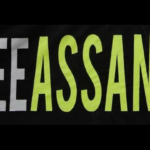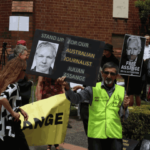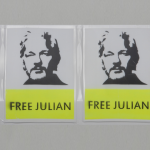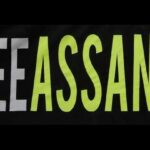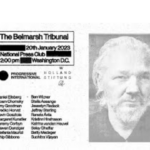Government Talks Loud But Does Little to Bring Julian Home
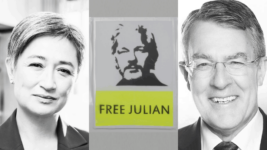
Many aspects of the ongoing detainment of Julian Assange in London’s notorious Belmarsh Prison at the behest of the White House, as it continues to seek the WikiLeaks founder’s extradition to the US, have been criticised as measures that undermine the rule of law.
Such criticisms tend to focus on Washington’s extraterritorial claims in attempting to prosecute a foreign journalist over publishing in an overseas jurisdiction, that the US spied on meetings Assange held with his legal team and false evidence that’s said to be contained within the US indictment.
So, when Australian foreign affairs minister Penny Wong recently raised the US and the UK operating under the rule of law as an excuse for why Assange’s matter has “dragged on too long”, it certainly added credence to the idea that the current government’s efforts in this regard are mere lip service.
Wong made the comments during a 1 February press conference at the Australian High Commission in London, after a journalist asked if the plight of Assange, an Australian citizen imprisoned in the UK for almost three years now, was something the minister might raise with her British counterparts.
Indeed, the senator’s speech is only the latest in a series of developments suggesting that while the Albanese government periodically announces its quietly negotiating the release of the Australian journalist, it’s rather following the lead of its more powerful allies with how the matter proceeds.
“Enough is enough”
Whilst she was on her official visit to London last week, Wong was questioned as to whether she’d be raising the UK government’s continued remanding of the journalist since 2019 on behalf of the US, especially in light of the repeated refrain our PM has been making in relation to the matter.
Albanese has stated that “enough is enough” regarding the UK extradition proceedings and whether these will result in his being sent to the US to stand trial. The prime minister said this in early 2021 prior to taking the top office, as well as in response to questions in parliament late last year.
Wong confirmed that Albanese’s assertion about Assange is the position of the entire government, and that her office is continuing to raise the case with the US and the UK. But she added that this wasn’t necessarily being done via diplomatic channels and nor was it being detailed to journalists.
And in response to a suggestion that this means Australia’s “entreaties are being ignored”, Wong implied that the delays were more to do with the “very many legal processes in which Mr Assange is involved” in, which take a while as they’re all proceeding under the rule of law.
No diplomatic cables
The questions put to Wong in London appear to have been sparked by a recent Michael West Media piece by former Senator Rex Patrick, in which he details that freedom of information queries regarding Assange had been put to the PM’s office, that of the attorney general and Wong’s office.
The queries relate to whether any of these offices were in possession of communications going back as far as when federal Labor took office last May, showing that they’ve been in contact with their US counterparts in relation to Assange. And the staff from each office confirmed no such documents exist.
Patrick highlights that that the FOI outcomes directly contradict the assertions made by Albanese in the lower house on 30 November, when he outlined that he’d personally been raising the issue with US representatives and he’d made clear “it was time that this matter be brought to a close”.
Albanese gave this response to a question from teal independent MP Monique Ryan, who, Patrick reports, has since stated in regard to the FOI revelations that if the government was serious about securing the release of Assange, then it would have been corresponding formally in writing.
Ryan added that she would be raising the matter further with the government as parliament resumes this month, and this time she’ll be asking for a more detailed response regarding what sort of tangible efforts are being made to secure his release.
Eroding press freedoms
Another criticism levelled at the government by Ryan is that whilst attorney general Mark Dreyfus hasn’t been actively attempting to secure the release of the WikiLeaks founder, he has found time to convene a press freedom roundtable for later this year.
In a 19 January statement, Dreyfus sets out that the national roundtable will engage media organisations and key stakeholders on the question of “a strong and independent media”, which, he underscores, “is vital to democracy and holding governments to account”.
The attorney general then goes as far as to state that “journalists should never face the prospect of being charged or even jailed just for doing their jobs”. And it would seem that while Dreyfus wasn’t intending any irony here, most would reflect on Assange’s position when reading his assertion.
Independent Australia editor Michelle Pini outlined in a recent article on the roundtable that her publication has been in contact with the organisers, who have informed it that there is no space for its staff to attend, as seats are already filled by individuals from the likes of News Corp and Nine.
But the biggest affront involved in this announcement is that, as journalists and commentators the world over have made clear, the attempted extradition of Assange, a foreign national, by the US over alleged offences committed on foreign soil threatens press freedoms everywhere.
So, rather than using his position as chief lawmaker of Australia to end the Assange case, and therefore, allaying the greatest threat to press freedom on a global scale ever, Dreyfus is going to consult with local compliant mainstream media on the further manufacture of consent.
Critical considerations
Respected Australian journalist John Lyons began the year appearing on ABC News to suggest that Assange will likely be released within the next two months, as Albanese is working behind the scenes to achieve this.
However, it’s uncertain as to whether Lyons knows anything more about the government’s actions in this regard than the rest of the public does.
While the other major development regarding the Albanese government’s backdoor diplomacy on Assange came to light last July, when human rights lawyer Kellie Tranter detailed the content of documents she’d secured from the AG’s office that suggest it was contemplating extradition as a valid option.
For its part, the UK government greenlighted the extradition of the Australian journalist to the US to stand trial last June, and Assange’s legal team has filed its final challenge to this decision with the UK High Court, whilst it also plans running another appeal in the European Court of Human Rights.
Doctors for Assange and veteran reporter John Pilger have warned that if Assange is imprisoned in the US it will likely mark his end, and, with his supporters’ last hopes near dashed in terms of Labor government assistance, the future appears grim for the innocent Townsville-born journalist.



